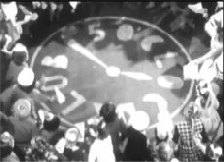
TV Pop Diaries
Pop Music on British Television 1955 -
A twice-
The two weekly shows were initially broadcast on Tuesday and Friday, but later changed to Tuesday and Thursday and like Thank Your Lucky Stars there was a summer replacement version, the Five O’Clock Funfair. The name then changed to Ollie & Fred’s Five O’Clock Club with Mike Negal & His Trio as the resident group, replaced for a few months by The Alexis Korner Group/Sextet/Quartet. Talking to TV Times about his unusual gig Alexis Korner said "I would rather entertain children than adults. Children appreciate any kind of music without prejudice. If a song is good, children like it. If it isn't they don’t. Children have no barriers against music of one type or another."
As well as the usually variety acts a couple of pop acts would appear on every show, not usually of the stature of The Beatles, but enough to warrant a search for any editions that may exist anywhere, as only two small portions of the show are known to exist at present.
Speaking to TV Times on the show's first anniversary John Rhodes, in charge of Rediffusion's children's programming said "This is all part of a curious revolution recently in children's tastes. This programme started off as the logical development of Tuesday Rendezvous. The idea has been to keep our ears very close to the ground and reflect progressive junior trends in the Club's format. Pop is just part of the child's new world. He won't be satisfied with second best. The Club immediately doubled the viewing figures of its predecessor and has maintained its lead ever since."
After a successful run with co-
The show was replaced in Summer 1965 by children’s talent show Stubby’s Silver Star Show, hosted by Stubby Kaye with Muriel Young. While The Five O'Clock Funfair, hosted by school teacher Marjorie Sigley was brought to a close in December 1965. The original version of the show returned, hosted once again by Muriel Young.
In July 1966 the show banned Neil Christian's new single 'Oops' as it was felt to be a little risque for a children's audience, despite David Essex's dodgy sounding Thigh High being played the following month. Records like this would occasionally challenge the producers for inclusion. Talking to Melody Maker a Rediffusion spokesman said "We don't ban records. They are considered as to their suitability for individual programmes."
By summer 1966 the show found itself going through what would be its last set of changes, as a Rediffusion spokesman said "We are now reorganising the show to cater for a wider variety of entertainments." Michael Segal, head of children's programming at Rediffusion had also made the unsubstantiated claim that children were going off pop music. 1966 had seen off Thank Your Lucky Stars, Ready Steady Go and (nearly) Top Of The Pops. Whatever the decision, it was a bit late. The show was dropped from the schedules in an announcement made by Rediffusion in August 1966. The series would be replaced by Disney Wonderland, later hosted by Gerry Marsden, one of Five O’Clock Club’s final guest hosts.
Like Tiswas in the late seventies the kids were the real stars, waving to the camera, poking their tongues out and making a lot of noise. A proper kids' show.
FIVE O’ CLOCK CLUB
Associated-
1st October 1963 -
